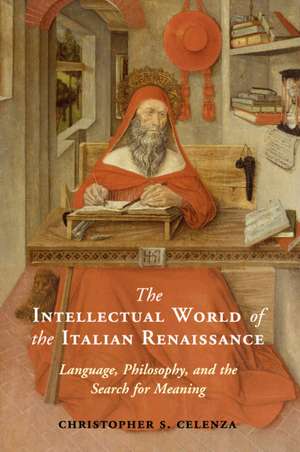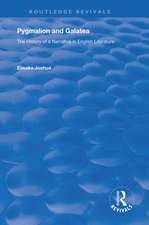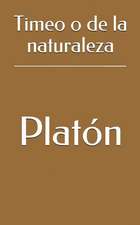The Intellectual World of the Italian Renaissance: Language, Philosophy, and the Search for Meaning
Autor Christopher S. Celenzaen Limba Engleză Paperback – 12 feb 2020
| Toate formatele și edițiile | Preț | Express |
|---|---|---|
| Paperback (1) | 234.44 lei 3-5 săpt. | |
| Cambridge University Press – 12 feb 2020 | 234.44 lei 3-5 săpt. | |
| Hardback (1) | 802.80 lei 6-8 săpt. | |
| Cambridge University Press – 13 dec 2017 | 802.80 lei 6-8 săpt. |
Preț: 234.44 lei
Nou
Puncte Express: 352
Preț estimativ în valută:
44.86€ • 46.56$ • 37.50£
44.86€ • 46.56$ • 37.50£
Carte disponibilă
Livrare economică 24 februarie-10 martie
Preluare comenzi: 021 569.72.76
Specificații
ISBN-13: 9780521177122
ISBN-10: 052117712X
Pagini: 454
Dimensiuni: 152 x 229 x 27 mm
Greutate: 0.66 kg
Editura: Cambridge University Press
Colecția Cambridge University Press
Locul publicării:New York, United States
ISBN-10: 052117712X
Pagini: 454
Dimensiuni: 152 x 229 x 27 mm
Greutate: 0.66 kg
Editura: Cambridge University Press
Colecția Cambridge University Press
Locul publicării:New York, United States
Cuprins
1. Beginnings; 2. Dante, Petrarch, Boccaccio; 3. The Italian Renaissance takes root in Florence; 4. Florentine humanism, translation, and a new (old) philosophy; 5. Dialogues, institutions, and social exchange; 6. Who owns culture? Classicism, institutions, and the vernacular; 7. Poggio Bracciolini; 8. Lorenzo Valla; 9. The nature of the Latin language: Poggio versus Valla; 10. Valla, Latin, Christianity, culture; 11. A changing environment; 12. Florence: Marsilio Ficino, I; 13. Ficino, II; 14. The voices of culture in late fifteenth-century Florence; 15. 'We barely have time to breathe'. Poliziano, Pico, Ficino, and the beginning of the end of the Florentine Renaissance; 16. Angelo Poliziano's Lamia in context; 17. Endings and new beginnings: the language debate.
Recenzii
'In The Intellectual World of the Italian Renaissance, Christopher Celenza provides a priceless vademecum for the study of Italian humanism. It rolls up in a delectable ball all that has come before: Garin and Kristeller; Burckhardt, Baron, and Martines; Fubini and Vasoli; Hankins, Allen, and the others. It presents in depth and with exquisite clarity the major works of nine leading humanists from Petrarch to Poliziano (plus many others introduced in discursive 'parentheses'), culminating with the writer and critic Pietro Bembo, who translates the humanist heritage into a new language of art, a Latinized Tuscan. The lucidity of the explication de textes is matched by the precision with which Celenza profiles his cast of characters, who are presented with full dimensionality in their psychological, social, and cultural contexts: the careerist Poggio, the brawler Valla, the self-made man and Medici servitor Poliziano.' Margaret L. King, The Catholic Historical Review
'This is an immensely learned book, written in a clear, accessible style and rich in insight and understanding. Celenza has followed the currents of language and philosophy - which he defines, as do his sources, as the love of wisdom rather than a defined discipline - as elements in the search for meaning and hence self-knowledge and shared values. It is the ideal place to begin a journey into the ideas and debates that informed the intellectual world of the Italian Renaissance.' Kenneth Bartlett, American Historical Review
'… Celenza presents a rich analysis and narrative of what it meant to participate in Renaissance Italian intellectual life. I recommend his book - either as a whole, or individual chapters as essays - to undergraduates studying intellectual life during the Florentine Renaissance, or to graduate students and early researchers, as a robust and very clear introduction to Renaissance intellectual life and Renaissance humanism.' Barry Torch, Renaissance and Reformation / Renaissance et Réforme
'The Intellectual World of the Italian Renaissance offers an accessible synthesis of intellectual history in Italy from Petrarch to Pietro Bembo … This book will become the standard introductory text to the subject for students, while specialists will also find here a well-written and thoughtful account of a topic that so often defies synthetic treatment … Historians and students of thought, culture and society, as well as literary scholars and students will all find much to ponder here.' Brian J. Maxson, H-Net reviews
'This is an immensely learned book, written in a clear, accessible style and rich in insight and understanding.' Kenneth Bartlett, The American Historical Review
'This is a rich and engaging study. Not a history of Renaissance philosophy as such, it is, rather, an examination of the intellectual worlds of the fifteenth century and in particular of the dominant role of Latin.' Michael J. B. Allen, Renaissance Quarterly
'This is an immensely learned book, written in a clear, accessible style and rich in insight and understanding. Celenza has followed the currents of language and philosophy - which he defines, as do his sources, as the love of wisdom rather than a defined discipline - as elements in the search for meaning and hence self-knowledge and shared values. It is the ideal place to begin a journey into the ideas and debates that informed the intellectual world of the Italian Renaissance.' Kenneth Bartlett, American Historical Review
'… Celenza presents a rich analysis and narrative of what it meant to participate in Renaissance Italian intellectual life. I recommend his book - either as a whole, or individual chapters as essays - to undergraduates studying intellectual life during the Florentine Renaissance, or to graduate students and early researchers, as a robust and very clear introduction to Renaissance intellectual life and Renaissance humanism.' Barry Torch, Renaissance and Reformation / Renaissance et Réforme
'The Intellectual World of the Italian Renaissance offers an accessible synthesis of intellectual history in Italy from Petrarch to Pietro Bembo … This book will become the standard introductory text to the subject for students, while specialists will also find here a well-written and thoughtful account of a topic that so often defies synthetic treatment … Historians and students of thought, culture and society, as well as literary scholars and students will all find much to ponder here.' Brian J. Maxson, H-Net reviews
'This is an immensely learned book, written in a clear, accessible style and rich in insight and understanding.' Kenneth Bartlett, The American Historical Review
'This is a rich and engaging study. Not a history of Renaissance philosophy as such, it is, rather, an examination of the intellectual worlds of the fifteenth century and in particular of the dominant role of Latin.' Michael J. B. Allen, Renaissance Quarterly
Notă biografică
Descriere
This book offers a new view of Italian Renaissance intellectual life, linking philosophy and literature as expressed in both Latin and Italian.


